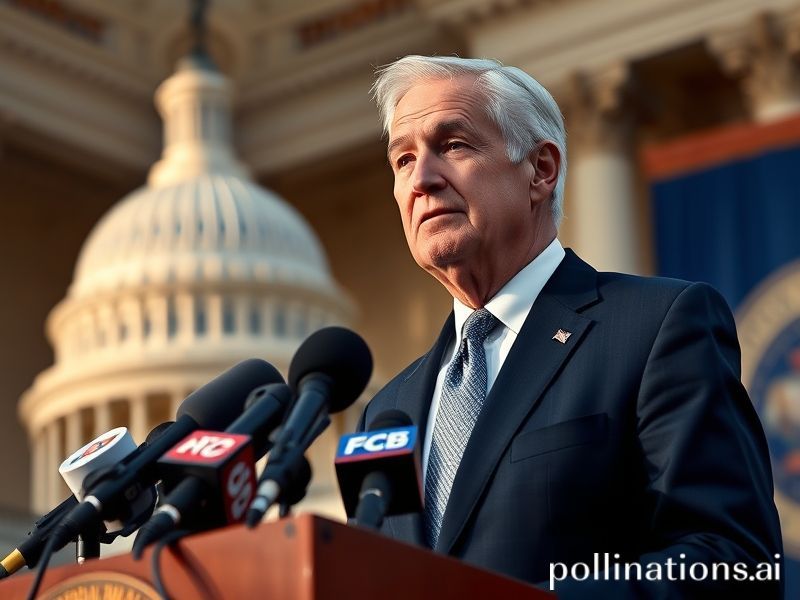Senator Cassidy’s Healthcare Circus: How One Louisiana Doctor Became the World’s Cautionary Tale
Senator Bill Cassidy and the Theater of American Healthcare
By C. L. Marlowe, International Affairs Desk, Dave’s Locker
PARIS—From a café terrace overlooking the Seine, where the house red is cheaper than a Band-Aid in Cleveland, Senator William “Bill” Cassidy looks less like a healer and more like an understudy who keeps forgetting his lines. The Louisiana Republican—physician, Sunday-school teacher, and proud wearer of the congressional lapel-pin that doubles as a GPS tracker for lobbyists—has spent the better part of a decade trying to reform the American healthcare system with the gusto of a man rearranging deck chairs on the Titanic while arguing about the thread-count of the deck towels.
To the rest of the planet, Cassidy’s saga is not merely a domestic curiosity; it is a case study in how a superpower treats illness like a subscription service. When he co-sponsored the Cassidy-Graham bill in 2017—an eleventh-hour attempt to repeal Obamacare that even fellow Republicans greeted with the enthusiasm reserved for lukewarm airplane fish—the global audience leaned in. Europeans, who pay for appendectomies the way Americans pay for parking meters, watched with the detached horror of people witnessing someone try to put out a grease fire with a Molotov cocktail. The bill died, of course, but not before reminding the world that the United States remains the only advanced economy where “medical bankruptcy” is a genre of GoFundMe.
Cassidy’s more recent push for price-transparency rules—hospitals must now post their rates as if they were menu specials at a bankrupt diner—earned polite applause from policy wonks in Singapore and snickers in Stockholm, where citizens simply swipe a card and worry about other things, like daylight. Yet even this modest reform is tangled in litigation thicker than the cholesterol levels of the constituents it purports to protect. Meanwhile, pharmaceutical executives—those cherubic angels of innovation—continue to hike insulin prices faster than you can say “shareholder dividend,” proving once again that capitalism and triage make strange bedfellows.
From Lagos to Lahore, the takeaway is clear: the fate of American healthcare is not just a Yank melodrama; it’s a weather vane for global capital flows. When Cassidy tweets about “patient choice,” foreign investors translate that as “captive market.” When he boasts that Louisiana has cut its uninsured rate, analysts in London hear “uncompensated care exported to the Emergency Department, interest compounded daily.” The International Monetary Fund may not list “Senator Cassidy’s legislative mood swings” as a macro-indicator, but currency traders still flinch every time the phrase “skinny repeal” trends, half-expecting the dollar to catch the flu.
And then there is climate change—because everything is, eventually. Cassidy’s home state loses a football field of coastline every hour and a half, which means his constituents will soon require not just stents but snorkels. When he talks about “resilience,” coastal Bangladeshis nod grimly; they’ve been resilient since before resilience was monetized. In this context, Cassidy’s healthcare crusade feels like debating the co-pay on chemotherapy while the house is on fire. Still, the show must go on; the Senate’s air-conditioning is excellent.
So what does the world actually learn from Senator Cassidy? First, that in America, policy is performance art funded by industries that profit from the plot twist. Second, that even a doctor-turned-legislator cannot cure what is fundamentally a design flaw: a system that treats health as a luxury good and illness as a pre-existing moral failing. And third, that spectators abroad should stock up on popcorn—and maybe universal coverage—because this miniseries has been renewed for another season, streaming live on C-SPAN with subtitles provided by schadenfreude.
In the end, Senator Cassidy may or may not achieve his legislative dreams. But he has already delivered one global public good: a cautionary tale so vivid that even the most market-mad finance minister thinks twice before uttering the words “American-style reform.” Somewhere in Copenhagen, a bureaucrat sips coffee, glances at his single-payer ledger, and mutters a quiet “tak” to the bayou for the reminder.







